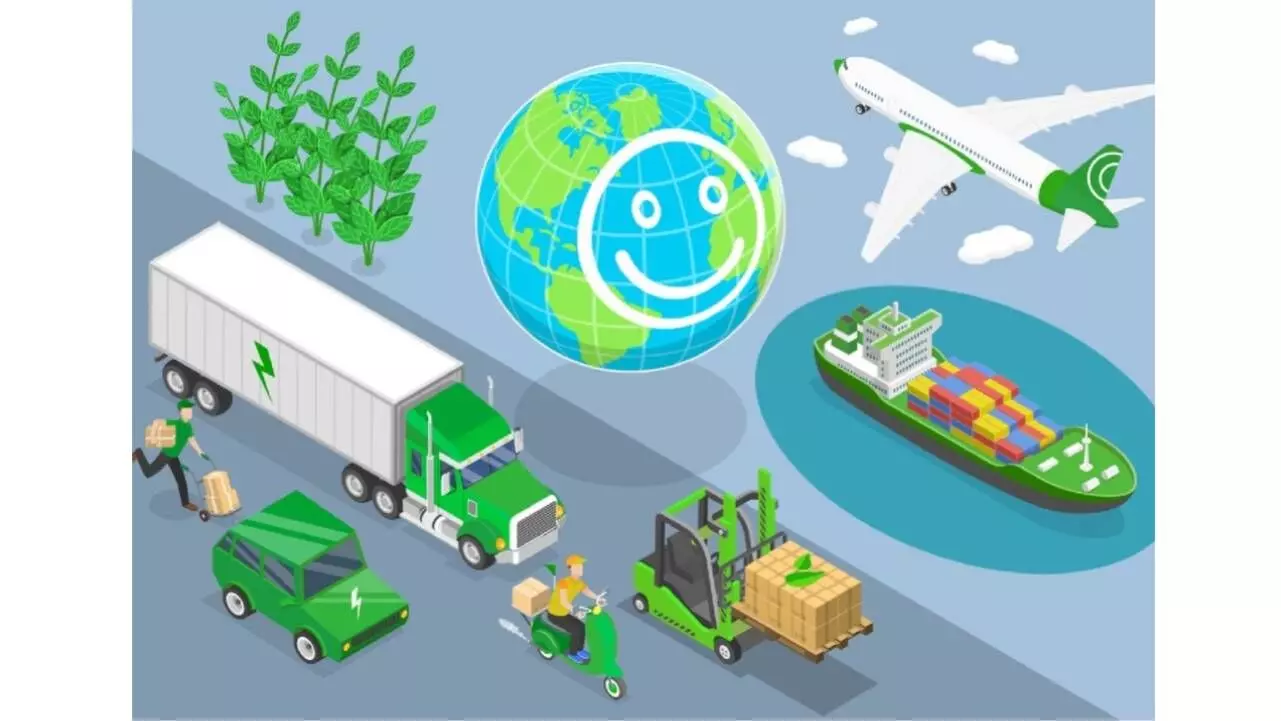Advancing sustainability in freight transportation with innovative solutions is the need of the hour
The transportation sector is a major contributor to carbon emissions in the country
In countries like India, these technologies, if implemented strategically, can save costs and increase efficiency. The International Transport Forum estimates that companies can annually save an average of $ 30,000 per vehicle for a mere 10 per cent increase in fuel efficiency

The freight industry is facing the twin challenges of meeting the rising demand while also reducing its environmental impact. As a crucial transporter in the global scale, from long-haul shipping to local deliveries, freight transport plays a pivotal part of the supply chains worldwide; sadly it also one of significant cause for carbon emissions.
India requires a remedy for it, mainly because the transportation sector is one of the biggest contributors to carbon emissions in the country. As per a study, from 2001 to 2020 CO₂ emission from the transportation sector has increased from 155.9 Mt to 368.2 Mt with road transport being the major contributor. It accounts for 88 per cent of all CO₂ emissions, while railways, airways, and waterways follow with seven per cent, four per cent and one per cent, respectively.
In order to resolve the existing problems and issue, there is an urgent need to come up with innovative solutions in sustainability. New technologies and new tactics are combining to forge the path toward greener freight transportation that satisfies global goals of operating efficiency while minimizing environmental impacts.
Our quest for rapid decarbonization requires a transformation in infrastructure planning on the multi-decade scale, and technology systems need to operate within sustainable frameworks. The more mature the sector, the greater is required from industry heads to incorporate innovative solutions. Investors are also pushing for greater alignment with sustainable practices, making it clear that the path forward will require a blend of forward-thinking and environmental responsibility.
Responding to demand for sustainability:
The rise of consumer demand for sustainability has had a profound impact on freight. And as emissions reduction becomes paramount, particularly among road users, freight companies are adopting greener practices to meet these expectations.
A McKinsey report showed that 64 per cent of drivers were concerned about the environment. Of them those who put sustainability as their first criteria for acquisition, 73 per cent would make NEVs (new-energy vehicles) next purchase preference with hybrid electric vehicles being the top choice.
In the last decade, due to various policy implementations, technological innovation and expanding consumer choices, the global electric vehicle (EV) markets like China and Europe have experienced significant growth. This is a trend that will pick up further pace as more and more freight companies are spending on green technologies and products.
As freight companies embrace NEVs and other eco-friendly innovations, they are responding to consumer preferences but in a broader sense establishing themselves as leaders among businesses transitioning toward greater sustainability.
Reducing carbon footprint with alternative fuels:
Alternative fuels like hydrogen and biofuels are driving carbon reduction for freight operations. Zero-emission transport from hydrogen as a clean energy source and net zero-carbon renewable options with biofuels for reduction of greenhouse gas emission are the preferred options. The McKinsey report shows the need for this change in urgency, claiming road transportation represents around 15 per cent of global CO₂ emissions and that it accounts for 74 per cent from total transport. It is important for industries looking to achieve their sustainability objectives and lessen carbon footprint that adapt these alternative fuels.
Boosting freight efficiency with digital technologies:
Digital technologies like IoT and AI are reshaping freight transport as they boost efficiency and cutting emissions. IoT sensors monitor cargo conditions in real-time, optimizing routes and reducing delays. AI analyses data for predicting demand and improving logistics, leading to fewer empty runs and lower fuel consumption. However, the digital infrastructure needed for autonomous vehicles is often overlooked. While some view digital transformation as a luxury, the fact is that it is essential for future growth.
The energy system also plays a big role in CO₂ emissions. Improving energy efficiency, especially in vehicle engines, can significantly limit these emissions. Governments should promote renewable energy and expand clean energy use to further reduce CO₂ from transportation, encouraging the industry to adopt digital technologies to optimally utilize the resources. It will take time to see a return on investment from these digital solutions but the long-term benefits are evident and worthy of their cost.
Importantly, these are not only aspects that contribute to a more sustainable and therefore green freight industry but also technologies that drive operational efficiency.
Enhancing fuel efficiency with smart logistics:
Innovations in logistics management, real-time tracking and route optimization are helping downstream to perform better. Companies reduce delays, fuel spending and improve routing by leveraging real-time data. This saves not only money, but reduces the carbon footprint of transport.
In countries like India where logistics operations are a large part of the economy, if implemented strategically, these technologies can save costs and increase efficiency. The transportation sector is said to be the single largest source of CO2 emissions, with around 24% energy-related global CO2 – resulting in climate change as a whole according to an International Energy Agency (IEA) report. The International Transport Forum estimates that companies can annually save an average of $ 30,000 per vehicle for a mere 10% increase in fuel efficiency.
In conclusion, using smart tools to track vehicles and find better routes helps in speeding up transportation and reduces costs. This is extremely significant for nations such as India, which can greatly be benefited by these innovations, to save money and earth.
(The writer is CEO of RASPN Shipping Services Private Limited)

